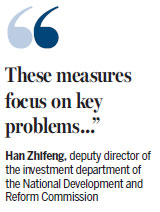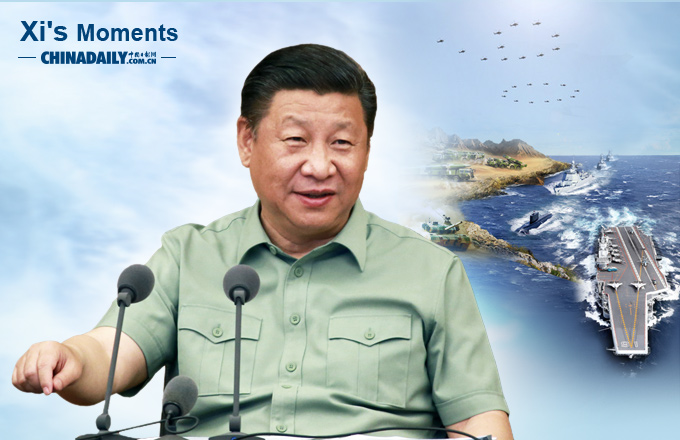New wave of measures to boost private investment
Governmental services will be improved with focus on projects
Though private investment growth bounced back in the past few months, economic development demands a greater increase from the sector to invigorate employment and market vitality.
That is why a slew of measures were released to boost private investment after a State Council executive meeting, presided over by Premier Li Keqiang on Friday.
The meeting called to further streamline administration and improve governmental services, by making it easier for privately invested projects to get approved, according to a statement released after the meeting.
Eligible projects should be approved in designated time after projects are checked by departments under the State Council and local governments.

Private companies were encouraged to participate in the "Made in China 2025" strategy, focusing on modern agriculture and technical upgrading.
A mechanism will be established to ensure reasonable returns for private investors when they take part in public-private-partnership projects in areas such as infrastructure and public amenities.
A credit evaluation system will also be improved and prioritize credit management, providing multiple financial services such as circular loans. Financial institutions will be prohibited from requiring additional conditions when granting loans.
The meeting encouraged local governments to set up funds to compensate for credit risk, which will increase support for small and medium-sized enterprises and technological startups. Stricter management will be conducted to control fees charged on companies and reduce institutional costs for the enterprises.
In addition, special checks will be conducted to review whether local governments have kept their promises to private investors, in accordance with laws and regulations. Any governmental behavior that hampers the legitimate rights of these enterprises will be punished, the statement added.
"These measures focus on key problems private investors are facing; I believe effective private investment will be boosted," said Han Zhifeng, deputy director of the investment department of the National Development and Reform Commission.
Private investment has been a focus of the central government and the premier, who is committed to reducing institutional costs and boosting finances for enterprises. On June 18 last year, the premier chaired a meeting to boost growth in the area.
"Private investment can strongly spur consumption and employment. It also concerns economic growth and restructuring," he said at the meeting.
Private investment has contributed about 60 percent of the country's total investment and created 80 percent of employment opportunities. It increased by 7.2 percent during the first half of this year, 4.4 percentage points higher than the first half of last year.
However, experts said private investors have been facing challenges such as financing difficulties and broken promises by local governments. In the first six months, private investment in industrial projects increased by 5.1 percent, slower than the total private investment.
Some favorable policies to support private investment have not been fully implemented and relevant departments should clear and revise outdated rules and regulations, Li Yizhong, deputy director of the economic committee of the Chinese People's Political Consultative Conference, was quoted by Xinhua News Agency as saying.
The mechanism to ensure returns for PPP projects was one of the most eye-catching points made during the meeting, said Wang Manchuan, secretary-general of the China Society of Administrative Reform.
Public-private-partnership has become a vital way to connect China's massive infrastructure building with private investments since 2014. By the end of March, the country had announced 700 public-private-partnership projects that attracted investment of 1.7 trillion yuan ($248 billion).
The success of PPP depends on reasonable returns and reducing risk, said the 2007 Nobel laureate Eric Maskin when he attended the Dameisha China Innovation Forum in November in Shenzhen, Guangdong province.
Reasonable return is key in promoting public-private-partnership as private investors or companies have to carry out these projects over the long term but actually earn a low income each year, which also imposes extra financial risks for contractors, said Yan Zhijun, a 45-year-old contractor for drainage pipes in Chaohu, Anhui province.
"These policies target safeguarding our interests and I believe it will be done if properly implemented by local governments," Yan added.




























